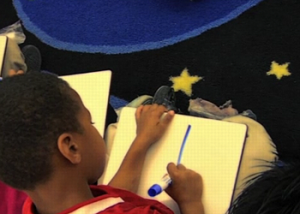We are educators. All of us. If one child drops out of school early, the whole community suffers.
We need to create the conditions that value all children especially our at-risk children. In Oakland, I saw how devastating the dropout rate was long ago when I was writing Digital High School grants and mentioned my concern. Young black boys were dropping out before eighth grade and it’s worse now.
Today only 30% of African-American males are graduating from high school in Oakland. This is wrong. We spend more money on prisons than educating our children. This is more than wrong. We need to start early educating, mentoring, and building community to raise our children — all children. Jean Quan, Mayor of Oakland, who was on the school board and understands the problem was on the panel of Class Action this morning (9/4/11) with Christopher Chatmon and Mitchell Kapor.
If children dropout and there are no jobs even for educated youth, what happens to these boys? Oakland Unified School District is taking action. They formed a task force called African-American Male Achievement with Chris Chatmon taking the lead. They are starting young with community schooling opening the schools and gyms with programs like Math and Science Academies. Mitchell Kapor from the Mitchell Kapor Foundation wrote…
“We will all lose if we persist in doing business as usual. Our state cannot continue to claim the mantle of innovation if we continue to ignore the human capital that exists in our communities. We cannot remain competitive in the global marketplace by investing more in filling up prison and jail cells – with disproportionately more poor people and people of color – than in creating an educated workforce.”
Read more: http://www.sfgate.com/cgi-bin/article.cgi?f=/c/a/2011/05/08/ED5L1JD5MR.DTL#ixzz1X0GJpsNx
 Chris Chatmon said on Class Action this morning: “The school system was not set up to meet the needs of black and brown boys. The street culture is stronger than school culture. We need a process of engaging and motivating by taking them through a value education.” Jean Quan is coordinating schools and the community. One big thing is keeping the libraries open.
Chris Chatmon said on Class Action this morning: “The school system was not set up to meet the needs of black and brown boys. The street culture is stronger than school culture. We need a process of engaging and motivating by taking them through a value education.” Jean Quan is coordinating schools and the community. One big thing is keeping the libraries open.
I love Oakland. I have worked with Oakland schools for years and saw the potential in every child. I am very excited that Oakland Unified School District has this task force and is working with the city and community leaders to make a difference in our children’s lives.
Here’s my take on it:
If we want to keep brown and black boys in schools and help each child reach their fullest potential, schools have to change. The schools still have top-down management issues. Doors are closed. Teachers are lecturing and teaching to the test. I walk through the halls and see kids not connecting and drifting off. They get bored and in trouble. Then it starts spiraling down. Like Chris mentioned: we need to make them co-designers of their learning so it is relevant to them. They not only need more role models, they need to find a purpose, a passion that gives them some hope that their lives will be worth something.
I see these kids. They are smart. But they are told they are not smart. We need to look at what “Smart” means. It is not how well they do on a test. We need to find different methods of assessing what they know and can do. I believe in these kids and am passionate about saving each one. I am only one person but there are more like me out there who want to help make a difference. I have seen the best teaching in Oakland and I work around the country, but teachers are caught in a bureaucratic system that keeps them from innovating. Unless there is a grant, there is no money to help build a new type of curriculum. Unless we “think out of the box”, we continue with the same prescriptive curriculum that does not engage our children.
Idea:
How about creating a K-12 Innovation community school in Oakland where all learning is centered around each child? Each child is part of a team similar to Finland.
Each child is with one teacher for K-3 and this community has parents, mentors, and community members part of the team for that child. Bring in a teacher education program from a local university and create teams Then another teacher can be assigned as advisor from grades 4-8 so there is consistency to monitor progress. Collect artifacts of learning and reflect via portfolios. Design new learning environments that foster creativity and inquiry. For 9-12 each teacher is an advisor for 20 students who guides them in the portfolio process and finds support in the community for internships, shadowing, interviews, building resumés and interviewing skills, and counseling on career and college readiness. Check out my post on Skills and Values Employers Want.
These are just a few ideas that can help all children and especially those at-risk.


